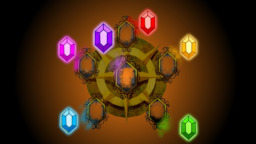
Book Two — The Two Trees
Canterlot is no more!
Jeuk, Master of the Unseelie Court, has slain Celestia and left her kingdom rocking on the precipice of the unknown. Merry and her Sirens scramble to unite the dissolved Equestria, but not everybody is willing to follow them. Their first move to solidify their power is to march on Ponyville, but the Crystal Empire looms in the north, and may prove to be their most stalwart foe.
The Bearers of the Elements of Harmony have been captured, with only Applejack running free. Her mission: to warn the families of her friends of the oppression of the Sirens, and their plans to capture anyone connected with the Bearers. She holds in her bag the Element of Kindness, the last hope they have to combat the power of the Unseelie Court.
But it is only one of the six.
Spike, Apple Bloom, Button Mash, Sweetie Belle, Rumble, and Scootaloo have taken on the task of scouring the world for the remaining Elements of Harmony. Their information is sparce, their equipment negligible, their plans uneasy. These six young people are the last best hope for Equestria to survive the Unseelie Court’s schemes, but hope grows faint in such trying times…
Samples from the Griffon-English Lexicon
Notes on pronunciation: “CH” always indicates a “TCH” sound, such as in “Church.” Never as a hard “K” as in Character, or a soft “SH” as in Machine.
Double vowels indicate the long vowel sound, and also that the sound be held for a 1/8th beat. Much of the griffon language has the feel of birdsong to it, to the point where listening to a native is akin to hearing a song being invented in real time. Political speeches are often transliterated with both text and musical notes to indicate specific dramatic pauses and flourishes.
The “M,” “V,” and “W” sounds are produced by special muscles vibrating in the throat. Species with lips lack these vital muscles, resulting in a clear accent whenever they speak Griffish. The humming of a griffon often sounds unnerving to those who are not used to hearing it.
Griffon sentence structure can be difficult to interpret as written, as their language is mainly made up of nouns and verbs with little connective tissue. It is often up to the listener to use context clues and tone to compile the meaning of the sentence. In addition, many words and phrases have deeper meaning than what would be indicated with a literal translation. Our English translation team has worked hard to make sure to localize the original Griffish to be as close as possible to the intended meaning.
Akelra – n. Neck. Can be used to describe anything within the neck ie. throat, vocal cords, esophagus (see Vakelra)
Chakaa – vb. To leave, especially on a long journey.
Chakii – vb. To return, especially after a long journey.
Fetack – vb. A command used to incite the object to action, often performing a predetermined course of action; ie. a performance or series of battle maneuvers. In the event of a surprise encounter with an enemy, the word is most times interpreted as “fight until we’re dead or they are.”
Gawrock – adj. Awesome. In slang, an exclamation that something is excellent, surprising, or perplexing.
Ka – exclamation. “No,” a denial, a refusal, indicates the following sentence has a reversed meaning.
Keekee – n. Mother (informal), came about due to the “kee” sound being the easiest for young hatchlings to speak.
Kree – conjunction, usually equivalent to “and.” Often implies symbiosis or mutual belonging in literature.
Kretch – n. Lightning (see Kretchwaugh).
Kretchwaugh – n./adj. Blitzwing, the Griffon King’s personal guard. Compound word from Kretch + Waugh. Literally “Lightning Wings” or “The one with lightning in their wings.” Often used in poetry to describe one of great power.
Krevatch – n. Griffon curse, no real equivalent in English, vulgarity is in direct proportion to the vehemence with which it is spoken.
Kroota – n. Friend.
Melchila – adj. Beautiful in every sense of the word, praiseworthy, good.
Sheesha – n. Father (informal), also a name for the Creator Being, who is regarded by the griffon orthodoxy as the father of all life.
Twee – Affirmative, yes, an indication that the object will performed the assigned task.
Vreen – n. Literally “King.” Masculine version of “Vreev.” A high-ranking individual, one whose political station is greater than your own. Used before the name of the individual as a title, or used by itself to refer to the individual.
Vreev – n. Literally “Queen.” Feminine version of “Vreen.” A high-ranking individual, one whose political station is greater than your own. Used before the name of the individual as a title, or used by itself to refer to the individual.
Vak – vb. To stab, to thrust, to plunge. To forcefully reveal something (see Vakelra).
Vakelra – n. Protector. Compound word from Vak + Akelra. Literally “One who thrusts out his neck” ie. “sticking your neck out for someone,” implying sacrificial protection.
Vakr – n. Sword (slang), especially one with a long, narrow blade for thrusting, ie. Martial’s rapiers.
Vakvikr – n. Sword. Can refer to any sword, but most often refers to one with a double-edged blade, able to slash and thrust with equal efficiency, ie. Euroclydon, Andean’s broadsword.
Vik – vb. To slash, to cut, to swing an object violently. Occasionally: to throw.
Vikr – n. Sword (slang), especially one with only one sharp edge for cutting, ie. a saber such as the twin Wyrmslayer blades.
Waugh – n. Wing (see Kretchwaugh).
